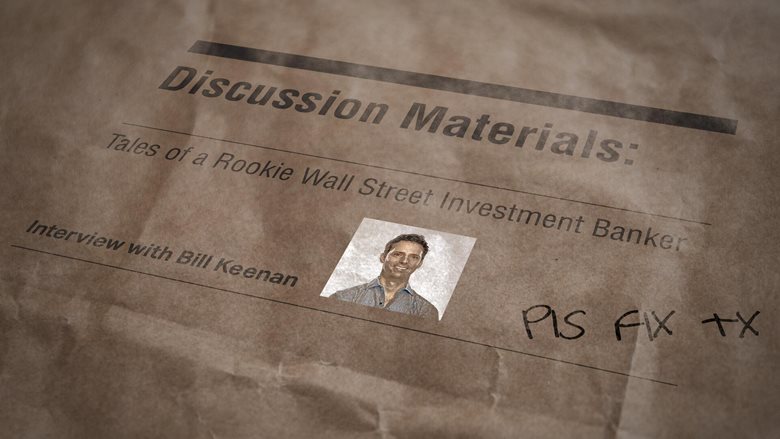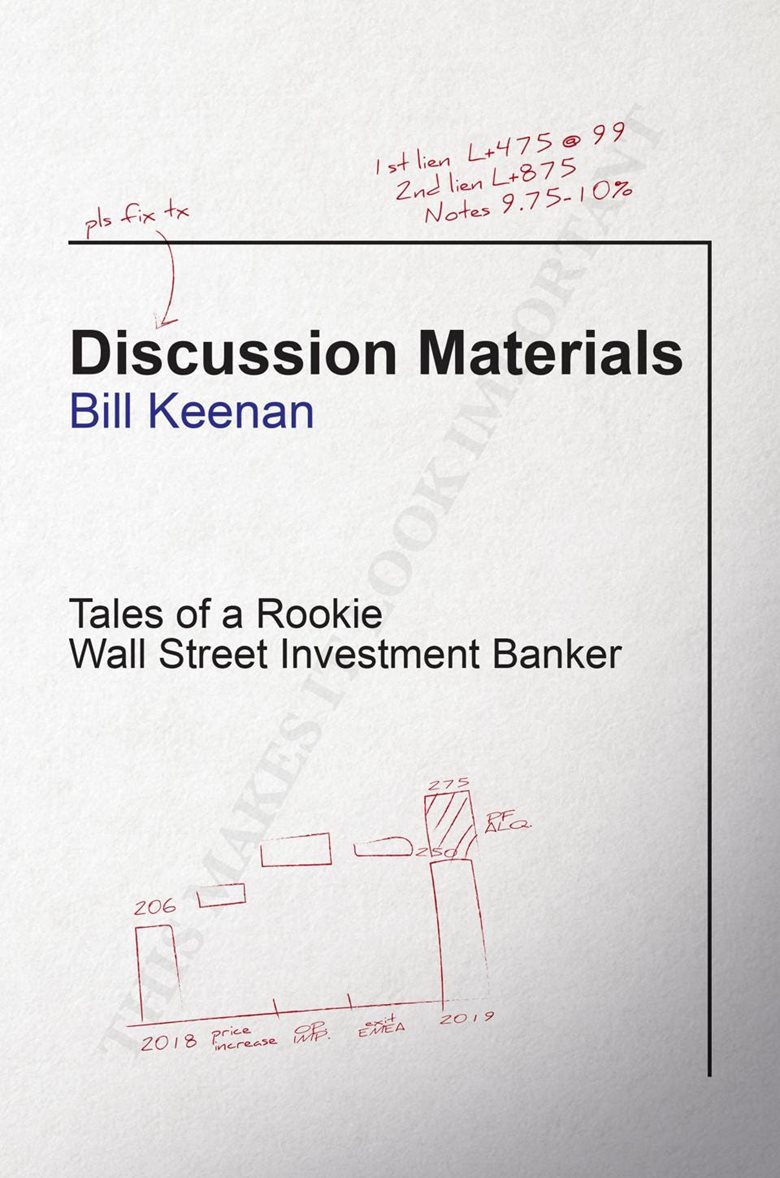Tales of a Rookie Wall Street Investment Banker
Discussion Materials with Bill Keenan
By AnsaradaTue Aug 31 2021Advisors

Tyler Hey, what's up, guys? And welcome back to another episode of Talking Shop with The Water Coolest. I’m your host, Tyler. And today I'm really excited to be joined by Bill Keenan. Some of you guys might know him. He wrote the book ‘Discussion Materials.’ He also wrote one of the most epic going away emails when leaving his job in banking.
Bill, thanks for being with us today.
Bill Thanks for having me.
Tyler Could you give us your elevator pitch?
Bill Grew up in New York City. I graduated from college at the height of the financial crisis. I had no idea what was going on. I just wanted to play hockey after playing in undergrad.
The NHL wasn’t calling, so I went to Europe and played minor pro in Germany and Sweden for three years. Came back home and wrote a book about that experience called ‘Odd Man Rush’ while I tried to find a job. Eventually ended up in business school, which led me to investment banking, which took me to my current job at Air Mail.
Tyler Unfortunately, it wasn't your hockey career that made you famous. I think it was probably the epic email that you sent out. Could you tell us a little bit about that?
You went through your banking career. You're about to leave and you send this email. Could you dive into that for someone who doesn't know?
Team,
My time has come. I’ve taken a position at the global private equity shop KKR (Kohlberg Keenan & Ravis) where I’ve been tasked with building out their cryptocurrency franchise.
Things I’ll miss: getting 7 calls from BIS minutes after sending over a request and explaining 7 times what I wrote clearly in the original email; padding my 110-hour staffing log with rogue assignments(a); having Dat swing by my desk and pester me (no, it’s not “live,” never is) even after I put in my headphones while he’s talking; non-speaking roles during credit calls; seeing Emily from time to time; pretending to know what specialty silicas are; watching full seasons of TV shows on Monday afternoons; MD’s assumption that the “F9” key magically re-does the model; Dammy’s ability to laugh through the depths of an all-nighter; forecasting interest expense as a percentage of sales in credit models; Burke standing 2 inches from me when he talks; the clarity and precision of Welsford mark-ups on the early turns; shootin’ the breeze with the 7’s; Prez over-promising and under-delivering; having the FactSet girl make price charts for me, then calling her back cause she sounds hot; having nary a clue if the seamless guy is on pine or wall street cause his flip phone has no volume control; hearing analysts say “will do” and “thanks” after getting shafted; V’ing up.
To my fellow junior bankers – I’m in awe of what you can do(b). I hope you each find what you’re looking for either here or elsewhere. And for those of you who’ve ever been staffed with me: sorry, but believe me when I say I was actually trying.
To Parin, Ashu, and the entire MAKS gang – I’m certain you’re breathing a collective sigh of relief. I’ve exhausted your capacity and blown up your Diwali weekends more times than you’d care to remember and for that, I hereby bequeath all my deal toys to you. Without you, I wouldn’t have gotten a job at DB. Seriously, you guys did the assignment that got me the offer during my internship though it took considerable work on my end to change notes in excel from “MA Knowledge Services” to “BKeenan.” Should you find yourselves stateside, beers are on me. I hope this is fine.
Lastly, a word of caution: to those of you who may find yourselves working in one of my old back-ups, tread carefully. This goes double if you’re staffed on Motiva where I hardcoded the entire football field in last summer’s deck.
Stay in touch.
Bill
Bill I had a sense during the first week of my internship that the banking thing wasn’t a long-term solution and that the experience would end poorly.
I was like a year and a half into my time at Deutsche Bank, and I remember it was my second winter vacation as a banker. You’ve got people all over you during the holidays and your BlackBerry won’t stop buzzing.
By the time February rolled around in 2018, I knew I had to get out. About a month before quitting, I started drafting the email. Just putting some ideas down gave me the conviction to commit to quitting. And I just remember thinking: This would be the first email at DB that I could write as myself. As a junior banker, you’re required to shut up and take orders daily, so expressing myself in this email was liberating, even when it only was in “drafts.” I had one really good friend who worked on the same floor. I just wanted to get a laugh out of him, since a lot of what was in the mail were things we both experienced.
Tyler One of my favorite lines was the MD's assumption that the F9 key magically fixes everything. You also gave a shout-out to the Seamless guy, which I think everyone who's worked an office job and has stayed late can appreciate.
You've been out of the game for a while. Is there anything you actually miss about investment banking?
Bill I think the most important thing that I took from that experience was meeting one of my best friends. I still talk to him all the time. And some of the interactions there day to day. It was kind of fun in a weird way. There was something fun about going through that experience at that time in our lives.
But then my buddy will forward me or screenshot staffing emails and MD comments. I see that and I quickly remember how brutal it was.
Tyler I'm sure you heard about the infamous Goldman Sachs deck where a bunch of analysts got together and did an informal survey and presented it to management. And of course, not unlike your going away message, it went pretty viral, and it actually sparked some changes at the bank.
I'm curious, what were your thoughts when you saw that Goldman deck? Did you think “good for you guys” or was it a “shut up and get back in the trenches, you're already getting paid a lot?”
Bill The formatting looked solid. You’ve got smart, driven, young minds there, and they decided the best way to express themselves was by leaking a deck. Something deeply sad about that. Then again, part of me wonders who actually made that deck.
They work so hard according to those charts they made, how do they have time to make that deck in the first place?
Tyler So is there any sum of money that would make it worth selling your soul for that shitty life? Do you have a number to go back to banking?
Bill I would go back for a billion-dollar annual salary with benefits.
Tyler Last summer David Solomon, CEO of Goldman, was sitting at lunch in the Hamptons and one of his associates or analysts came up to him during a workday. And it kind of blew up internally, apparently. So, I have a question for you. You’re a first-year analyst, you see your boss or a superior across the bar in the Hamptons while you're “working from home.” How are you playing that situation?
Bill I'm probably ignoring him and finding the cutest girl there and hitting on her.
Tyler That makes sense. So besides avoiding your boss, hitting on the prettiest girl, what is your best advice for someone who's in college or a current MBA who's actually looking to break into banking? Besides, probably, “don't do it.”
Bill Embrace the misery, commit to it. If you want to try banking, then give it a shot. You're going to make some money, and you'll probably come out having learned some stuff. Plus, you’re given credit by the outside world for way more than you deserve, and that’s a huge help once you leave.
You’re going to get hit in the face on day one. So don't belabor it by spending all summer preparing. Taking fifty corporate finance classes in school isn’t the answer.
Tyler Do you think it's important to be in the office, especially as an intern or analyst, or do you think it's a job that you can do from home?
Bill Putting the COVID safety issue aside…
Junior bankers and analysts are really at a disadvantage because to get up to speed so much time and so much of what you rely on is your peers that are the senior group, the senior analysts, and associates.
Because what'll happen is you'll get there as a first-year, and you'll befriend older juniors. And before you know it, they'll commandeer your swivel chair and start doing your work, and you're just sitting there taking notes and figuring out what the hell they're doing. So they become your guide. And that's critical. And I had that. The bullpen with all the senior analysts was right there.
On the flip side, I think if you're a senior analyst or an associate that's been there for a couple of years, you're probably better off because you don't have those junior kids annoying you and asking you to do stuff for them. And I think they're probably better off because they’re the ones that know what they're doing, they can just churn stuff out. They can work for seven, eight hours and go in these spurts. The only thing that disturbs them is somebody asking them questions. So they might actually be better off, more efficient at least.
But when it's all said and done, I would not have written a book if I wasn't in the office. The banking experience was about being in that office on Wall Street. It heightens the highs and the lows, and that’s what I remember… as shitty as it was at the time. In retrospect, those are the memories that made me want to write about it. It was all the day-to-day stuff, the small things happening. Like the MD that is so huge that he can't fit down the hallway. So he's got to go around the other way. Those are what made it interesting.
Tyler What's one of your favorite stories from your time? It could be in the book or not in the book.
Bill There’s just little things that I remember like there was one MD that, you know, basically the way that our floor was situated, it's a big loop. On the perimeter, you've got the MD offices all looking out onto the water. And then in between that you've got all the cubicles where the directors and down sit.
This one MD that I worked for, was in his office, no matter what time. He's the type of guy that would get in at like six-thirty, seven in the morning. And when you come out of the elevator, and you see him on the phone with this headset, he’s always hysterical. And you didn't know if he was hysterically mad or happy. I was always like, how's the day going to be? And it will be directly affected by what I see when I walk through those doors. Of course, his door is closed, and they're soundproof. So there was always some sort of anticipation, of not knowing, which made it kind of exciting.
It was always the little things… like how could I sneak out on a Friday if the staffer is still here. I don't have work. He thinks I have work. What exit stairwell should I use to go down a floor and then take the elevator? It’s more of the everyday scheming that I miss.
Tyler Could you tell us more about your current job at Air Mail?
Bill We’re a digital magazine and publish new issues every Saturday morning. I joined a few months after quitting banking and have been there from the start of the company. My first task was forming the LLC for the company.
Graydon Carter, who’d been the editor at Vanity Fair for twenty-five years, started Air Mail. He gave me an opportunity more than anything to be myself. And that was one thing I realized is a huge luxury, because for two years of banking not being myself, except for that final email, I realized that's not a way to go about living your life. So this job, I get to be myself. For better or worse.
Tyler I really appreciate you hopping on with us, Bill. This was a lot of fun. It was great to hear about some of your experiences and what your thoughts are on banking these days.
Bill Thanks so much.
END.
At Ansarada, we're big fans of Investment Bankers. Our mission is to make your life easier by building technology to reduce risk, boost efficiency and improve decision making so you can rest easy.
Since 2005, modern dealmakers have trusted Ansarada's Virtual Data Room on over 23,000 transactions and $1 trillion worth of deals, including M&A, divestments, capital raising, IPOs, and restructures.

Discussion Materials by Bill Keenan POST HILL PRESS
With Ansarada’s new online quoting process, it takes 3 clicks and approximately 15 seconds to magically open your data room.


